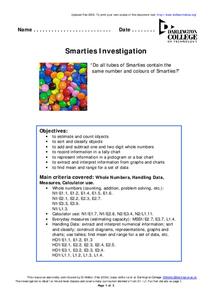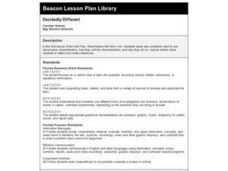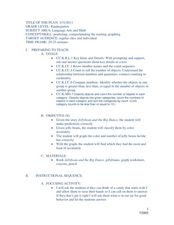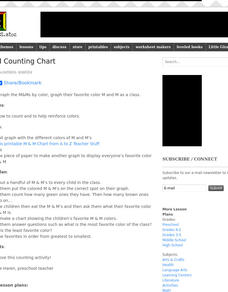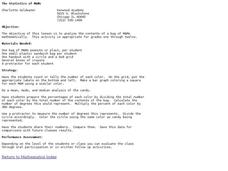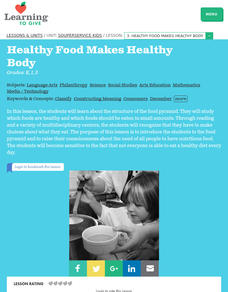Curated OER
Smarties Investigation
In this math instructional activity, students participate in an investigation of Smarties candy. For example, students estimate how many candies they have in each color, count the actual number, and record the information in a tally chart.
Curated OER
Mr. Funny Bones Math
In this Mr. Funny Bones math worksheet, learners count the total number of candy bones, sort them into five categories, and graph the number of each kind. Students graph five groups of bones.
Curated OER
Our Favourite Halloween Treat
Students conduct a survey about Halloween candy and create a bar graph illustrating the data. In this data analysis activity, stud nets are introduced to the topic with a discussion and survey, then the class creates a large graph and...
Curated OER
Decidedly Different
Fifth graders inquire as to why scientists use observable characteristics, how they sort the characteristics, and why they do so. They write journal entries to be used throughout this unit.
Curated OER
The Jellybeans and the Big Dance
Enchant your youngsters by reading them The Jellybeans and the Big Dance, by Laura Numeroff and Nate Evans. Ask them to name objects that begin with the letter J like jellybeans. Give each of them some jellybeans to sort by color. They...
Curated OER
M & M Counting Chart
Students create an individual M&M's graph based on the number of each color of candy pieces in their handful of candy. They graph the favorite color of the whole class while practicing counting and color identification.
Curated OER
The M&M's Brand Chocolate Candies Counting Book
First graders use estimation skills and gather data and record their findings
Curated OER
Junk Food Math
Students use Skittles candies as they explore estimation and percentages. In this math lesson plan, students sort, count, and chart Skittles candies to learn about estimation and study percentages.
Curated OER
The Statistics of M&Ms
Students explore the topic of statistics with M and Ms. In this math lesson plan, students use candy pieces to sort and gather information needed to create a bar graph. This instructional activity can be adapted to accommodate students...
Curated OER
Solids and Water
Students investigate mixtures made of water and familiar solid materials. They observe and discuss the changes that occur immediately and set the mixtures aside for a day. Finally, students observe the mixtures, note changes, and graph...
Curated OER
Put Your Heart Into It
First graders sort Valentine candies according to kind. Data is inserted into a spreadsheet and displayed in various graphic formats.
Curated OER
Sweet or Sour, Like or Different
Students watch a video on comparisons and discuss ways in which objects can be sorted. They play an identification game with a lemon and discuss identification characteristics.
Curated OER
Classification Introduction
Students simulate classifying rocks using different colored skittles. In this earth science activity, students create a Venn diagram according to their compiled information. They share this diagram in the class.
Curated OER
Heathly Foods Makes Heathly Body
Students examine and identify foods on the food pyramid. They catergorize food and place them on the correct level. They discover why they should eat foods in moderation.
Curated OER
Trash Count
Students identify pollution around their local community. They discuss the sources of polution and categorize objects based on their properties. They discover ways to make changes to the environment and how to inform the public.


